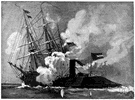mon·i·tor
(mŏn′ĭ-tər)n.
1. One that admonishes, cautions, or reminds, especially with respect to matters of conduct.
2. A pupil who assists a teacher in routine duties.
3.
a. A usually electronic device used to record, regulate, or control a process or system.
b. A video display or speaker used in a production studio to check audio or video quality: The sound engineer detected a hiss on the monitor.
c. Computers A device that accepts video signals from a computer and displays information on a screen; a video display.
4. Computers A program that observes, supervises, or controls the activities of other programs.
5. An articulated device holding a rotating nozzle with which a jet of water is regulated, used in mining and firefighting.
6.
a. A heavily ironclad warship of the 19th century with a low, flat deck and one or more gun turrets.
b. A modern warship designed for coastal bombardment.
7. See monitor lizard.
v. mon·i·tored, mon·i·tor·ing, mon·i·tors
v.tr.
1. To check the quality or content of (an electronic audio or visual signal) by means of a receiver.
2. To check by means of an electronic receiver for significant content, such as military, political, or illegal activity: monitor a suspected criminal's phone conversations.
3. To keep track of systematically with a view to collecting information: monitor the bear population of a national park; monitored the political views of the people.
4. To test or sample, especially on a regular or ongoing basis: monitored the city's drinking water for impurities.
5. To keep close watch over; supervise: monitor an examination.
6. To direct.
v.intr.
To act as a monitor.
mon′i·tor·ship′ n.
American Heritage® Dictionary of the English Language, Fifth Edition. Copyright © 2016 by Houghton Mifflin Harcourt Publishing Company. Published by Houghton Mifflin Harcourt Publishing Company. All rights reserved.
monitor
(ˈmɒnɪtə)n
1. a person or piece of equipment that warns, checks, controls, or keeps a continuous record of something
2. (Education) education
a. a senior pupil with various supervisory duties
b. a pupil assisting a teacher in classroom organization, etc
3. (Electronics) a television screen used to display certain kinds of information in a television studio, airport, etc
4. (Computer Science) the unit in a desk computer that contains the screen
5. (Electronics)
a. a loudspeaker used in a recording studio control room to determine quality or balance
b. a loudspeaker used on stage to enable musicians to hear themselves
6. (Mechanical Engineering) a device for controlling the direction of a water jet in fire fighting
7. (Animals) any large predatory lizard of the genus Varanus and family Varanidae, inhabiting warm regions of Africa, Asia, and Australia. See also Komodo dragon
8. (Mining & Quarrying) mining Also called: giant a nozzle for directing a high-pressure jet of water at the material to be excavated
9. (Military) (formerly) a small heavily armoured shallow-draught warship used for coastal assault
vb (tr)
10. to act as a monitor of
11. (Mechanical Engineering) to observe or record (the activity or performance) of (an engine or other device)
12. (Broadcasting) to check (the technical quality of) (a radio or television broadcast)
[C16: from Latin, from monēre to advise]
monitorial adj
ˌmoniˈtorially adv
ˈmonitorˌship n
ˈmonitress fem n
Collins English Dictionary – Complete and Unabridged, 12th Edition 2014 © HarperCollins Publishers 1991, 1994, 1998, 2000, 2003, 2006, 2007, 2009, 2011, 2014
mon•i•tor
(ˈmɒn ɪ tər)n.
1. a student appointed to assist in the conduct of a class or school, as to help keep order.
2. a person who admonishes, esp. with reference to conduct.
3. something that serves to remind or give warning.
4. a device or arrangement for observing, detecting, or recording the operation of a machine or system, esp. an automatic control system.
5. an instrument for detecting dangerous gases, radiation, etc.
6. Radio and Television. a receiving apparatus used in a control room or studio for monitoring transmissions.
7. a component with a display screen for viewing computer data, television programs, etc.
8.
a. a former U.S. steam-propelled, armored warship of very low freeboard.
b. (cap., italics) the first of such warships, used by Union forces against the Merrimack in 1862.
9. a raised construction straddling the ridge of a roof and having windows or louvers for lighting or ventilating a building.
10. any lizard of the family Varanidae, of Africa, S Asia, the East Indies, and Australia, fabled to give warning of the presence of crocodiles.
v.t. 11. Radio and Television. to listen to (transmitted signals) on a receiving set in order to check the quality of the transmission.
12. to observe, record, or detect (an operation or condition) with instruments that have no effect upon the operation or condition.
13. to oversee, supervise, or regulate.
14. to watch closely for purposes of control, surveillance, etc.; keep track of.
v.i. 15. to serve as a monitor, detector, supervisor, etc.
[1540–50; < Latin: adviser =moni-, variant s. of monēre to advise, warn + -tor -tor]
mon′i•tor•ship`, n.
Random House Kernerman Webster's College Dictionary, © 2010 K Dictionaries Ltd. Copyright 2005, 1997, 1991 by Random House, Inc. All rights reserved.
mon·i·tor
(mŏn′ĭ-tər)1. A device that accepts video signals from a computer and displays information on a screen. See Note at pixel.
2. Any of various meat-eating lizards living in tropical regions of Asia and Africa, and in Australia and New Guinea. Monitors range in length from about an inch to 10 feet (2.5 centimeters to 3 meters), the largest being the Komodo dragon of Indonesia.
The American Heritage® Student Science Dictionary, Second Edition. Copyright © 2014 by Houghton Mifflin Harcourt Publishing Company. Published by Houghton Mifflin Harcourt Publishing Company. All rights reserved.
monitor
Past participle: monitored
Gerund: monitoring
| Imperative |
|---|
| monitor |
| monitor |
Collins English Verb Tables © HarperCollins Publishers 2011
monitor
1. The part of a ROM which holds instructions telling a CPU how to operate.
2. The computer screen.
Dictionary of Unfamiliar Words by Diagram Group Copyright © 2008 by Diagram Visual Information Limited
ThesaurusAntonymsRelated WordsSynonymsLegend:
| Noun | 1. |  monitor - someone who supervises (an examination) monitor - someone who supervises (an examination)invigilator - someone who watches examination candidates to prevent cheating supervisor - one who supervises or has charge and direction of |
| 2. |  monitor - someone who gives a warning so that a mistake can be avoided monitor - someone who gives a warning so that a mistake can be avoided | |
| 3. |  Monitor - an ironclad vessel built by Federal forces to do battle with the Merrimac Monitor - an ironclad vessel built by Federal forces to do battle with the Merrimac | |
| 4. |  monitor - display produced by a device that takes signals and displays them on a television screen or a computer monitor monitor - display produced by a device that takes signals and displays them on a television screen or a computer monitorcomputer, computing device, computing machine, data processor, electronic computer, information processing system - a machine for performing calculations automatically computer monitor - a device that displays signals on a computer screen video display, display - an electronic device that represents information in visual form cathode-ray oscilloscope, CRO, oscilloscope, scope - electronic equipment that provides visual images of varying electrical quantities | |
| 5. | monitor - electronic equipment that is used to check the quality or content of electronic transmissions electronic equipment - equipment that involves the controlled conduction of electrons (especially in a gas or vacuum or semiconductor) television system, television - a telecommunication system that transmits images of objects (stationary or moving) between distant points television monitor, tv monitor - monitor used in a studio for monitoring the program being broadcast | |
| 6. |  monitor - a piece of electronic equipment that keeps track of the operation of a system continuously and warns of trouble monitor - a piece of electronic equipment that keeps track of the operation of a system continuously and warns of troublecardiac monitor, heart monitor - a piece of electronic equipment for continual observation of the function of the heart electronic equipment - equipment that involves the controlled conduction of electrons (especially in a gas or vacuum or semiconductor) electronic fetal monitor, electronic foetal monitor, fetal monitor, foetal monitor - an electronic monitor that monitors fetal heartbeat and the mother's uterine contractions during childbirth | |
| 7. |  monitor - any of various large tropical carnivorous lizards of Africa and Asia and Australia; fabled to warn of crocodiles monitor - any of various large tropical carnivorous lizards of Africa and Asia and Australia; fabled to warn of crocodileslizard - relatively long-bodied reptile with usually two pairs of legs and a tapering tail genus Varanus, Varanus - type and sole extant genus of the Varanidae African monitor, Varanus niloticus - destroys crocodile eggs dragon lizard, giant lizard, Komodo dragon, Komodo lizard, Varanus komodoensis - the largest lizard in the world (10 feet); found on Indonesian islands | |
| Verb | 1. | monitor - keep tabs on; keep an eye on; keep under surveillance; "we are monitoring the air quality"; "the police monitor the suspect's moves" observe - watch attentively; "Please observe the reaction of these two chemicals" |
| 2. | monitor - check, track, or observe by means of a receiver observe - watch attentively; "Please observe the reaction of these two chemicals" |
Based on WordNet 3.0, Farlex clipart collection. © 2003-2012 Princeton University, Farlex Inc.
monitor
verb
1. check, follow, record, watch, survey, observe, scan, oversee, supervise, keep an eye on, keep track of, keep tabs on Officials had not been allowed to monitor the voting.
noun
2. screen, VDU, visual display unit He was watching tennis on a television monitor.
3. guide, observer, supervisor, overseer, invigilator Government monitors will continue to accompany reporters.
4. prefect (Brit.), head girl, head boy, senior boy, senior girl As a school monitor he set a good example.
Collins Thesaurus of the English Language – Complete and Unabridged 2nd Edition. 2002 © HarperCollins Publishers 1995, 2002
Translations
شَاشَةمُراقِب الصَّفمِرْقاب، جِهاز مُراقَبَهيُراقِب بالمِرْقاب
monitormonitorovatpředseda třídykontrolovat
monitorovervågepræfektskærm=-monitor
valvojamonitorinäyttönäyttöpäätetarkkailija
monitor
felügyelõ
bekkjarumsjónarmaîurhafa eftirlit meîskjár, eftirlitstæki
モニター
모니터
monitoriusseniūnasvaizduoklis
klases vecākaiskontrolētmonitorsvērot, sekot
monitormonitorować
monitormonitorovaťpredseda triedy
bildskärmmonitor
เครื่องควบคุม
máy kiểm tra
monitor
[ˈmɒnɪtəʳ]A. N
1. (TV, Comput, Med) → monitor m
2. (= person) → supervisor(a) m/f (Rad) → radioescucha mf (Scol) → encargado/a m/f (de la disciplina)
human rights monitors → supervisores de los derechos humanos
human rights monitors → supervisores de los derechos humanos
B. VT
1. (= control, check) [+ progress, process] → seguir (la marcha de), controlar; [+ elections] → observar; (with machine) → monitorizar, monitorear
we are monitoring the situation closely → estamos observando or controlando la situación de cerca
we are monitoring the situation closely → estamos observando or controlando la situación de cerca
2. (Rad) [+ foreign broadcasts, station] → escuchar
Collins Spanish Dictionary - Complete and Unabridged 8th Edition 2005 © William Collins Sons & Co. Ltd. 1971, 1988 © HarperCollins Publishers 1992, 1993, 1996, 1997, 2000, 2003, 2005
monitor
[ˈmɒnɪtər] n
(= screen) [computer] → moniteur m; [TV] → écran m de contrôle
He was watching a game of tennis on a television monitor → Il regardait un match de tennis sur un écran de contrôle.
He was watching a game of tennis on a television monitor → Il regardait un match de tennis sur un écran de contrôle.
(MEDICINE) (in hospital) → monitoring m, moniteur m cardiaque
The patient was connected to the monitor → Le patient était relié au monitoring or au moniteur cardiaque.
The patient was connected to the monitor → Le patient était relié au monitoring or au moniteur cardiaque.
(= overseer) [elections, political process] → contrôleur/euse m/f
(= minder) → contrôleur/euse m/f
vt
[+ progress] → contrôler
[+ voting, election, situation, ceasefire, activities] → contrôler
[+ heart beat] → contrôler
[+ foreign station] → être à l'écoute de
Collins English/French Electronic Resource. © HarperCollins Publishers 2005
monitor
n
(Sch) → Schüler(in) m(f) → mit besonderen Pflichten; stationery/book monitor → Schreibwaren-/Bücherwart(in) m(f)
(TV, Tech: = screen) → Monitor m
(= observer) → Überwacher(in) m(f); (of telephone conversations) → Abhörer(in) m(f); (Rad) → Mitarbeiter(in) m(f) → am Monitordienst
(also monitor lizard) → Waran m, → Waranechse f
vt
Collins German Dictionary – Complete and Unabridged 7th Edition 2005. © William Collins Sons & Co. Ltd. 1980 © HarperCollins Publishers 1991, 1997, 1999, 2004, 2005, 2007
monitor
[ˈmɒnɪtəʳ]1. n
a. (Brit) (Scol) → capoclasse m/f (Am) (Scol) → chi sorveglia agli esami
b. (TV, Tech) (screen) → monitor m inv (Radio) (person) → addetto/a all'ascolto delle trasmissioni dall'estero
2. vt (foreign station, broadcast) → ascoltare le trasmissioni di; (machine, progress) → controllare; (discussion) → dirigere, fare da moderatore/trice in or di
Collins Italian Dictionary 1st Edition © HarperCollins Publishers 1995
monitor
(ˈmonitə) noun1. a senior pupil who helps to see that school rules are kept.
2. any of several kinds of instrument etc by means of which something can be constantly checked, especially a small screen in a television studio showing the picture which is being transmitted at any given time. television monitor; computer monitor.
verb to act as, or to use, a monitor; to keep a careful check on. These machines/technicians monitor the results constantly.
Kernerman English Multilingual Dictionary © 2006-2013 K Dictionaries Ltd.
monitor
→ شَاشَة monitor monitor Monitor ενδείκτης monitor valvoja écran monitor monitor モニター 모니터 monitor overvåker monitor monitor монитор monitor เครื่องควบคุม gözcü máy kiểm tra 显示器Multilingual Translator © HarperCollins Publishers 2009
mon·i·tor
n. monitor.
1. instrumento electrónico usado para monitorear una función;
2. persona que supervisa una función o actividad;
v. monitorear, chequear sistemáticamente con un instrumento electrónico una función orgánica, tal como los latidos del corazón.
English-Spanish Medical Dictionary © Farlex 2012
monitor
n monitor m; blood pressure — tensiómetro, baumanómetro (Mex), aparato para medir la presión de la sangre; cardiac — monitor cardíaco; event — monitor de eventos; fetal heart — monitor fetal, cardiotocógrafo; blood glucose — medidor m de glucosa en sangre, aparato para medir el azúcar en la sangre; Holter — monitor Holter, monitor cardíaco ambulatorio continuo de 24 horas; vt monitorizar, monitorear, seguirEnglish-Spanish/Spanish-English Medical Dictionary Copyright © 2006 by The McGraw-Hill Companies, Inc. All rights reserved.